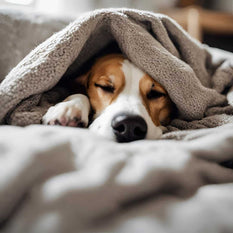How Long do Dogs Sleep?
Learn How to Aid Natural Sleep with CBD for Dogs
A common question dog owners have; is how long do dogs sleep? Sometimes owners can be concerned that their dog sleeps a lot or too little. Although it varies depending on the breed, age and overall health, on average dogs sleep between 12 to 14 hours a day.
Knowing the natural sleeping patterns of your dog and understanding abnormal sleeping behaviours can help you ensure your pup is getting enough rest. Additionally, CBD for dogs may aid natural sleep and help reduce anxiety and stress.
In this blog post, we'll explore how long dogs sleep for, normal sleeping patterns for dogs, dog sleeping positions and abnormal sleeping for dogs as well as how dog CBD can help aid with sleep for dogs.

The Importance of Sleep for Dogs
Getting enough sleep is essential for dogs, just as it is for humans. it is even more important for puppies, as they are growing and developing radily. Some of the benefits of a good night sleep on dogs are the following:
- Sleep plays a crucial role in their overall health and
well-being - Adequate sleep helps dogs to recharge their energy levels
- Promotes muscle growth and repair
- Supports their immune system
Rem Sleep in Dogs
One interesting aspect of a dog's sleep is that they experience REM sleep, just like humans. The majority of dreams occur during rapid eye movement (REM) sleep. The way your eyes move beneath your eyelids when you dream is how it gets its name. Your brain activity when you are asleep during REM sleep resembles brain activity when you are awake. Approximately 25% of your overall sleep duration is spent in REM sleep.
During REM sleep, dogs may exhibit various movements and vocalisations, suggesting that they are dreaming. This can be a fascinating insight into their inner world and provides valuable mental stimulation. This why often owners will say ‘they must be chasing rabbits’ when their dog twitches when sleeping. These twitches are often nothing to worry about and are associated with REM sleep or active dreaming.
Emotional Well-Being
Sleep is essential for dogs' emotional well-being. Similar to humans, lack of sleep can lead to increased anxiety and irritability in dogs.
A good night's sleep helps to regulate their mood and reduce stress levels, leading to a happier and more balanced dog.
As a responsible dog owner, it is important to provide your furry friend with a comfortable and quiet sleeping environment. This will help them achieve the restorative sleep they need to stay healthy and happy. Additionally, understanding the normal sleeping patterns of dogs can help you identify any potential issues or abnormalities.

How Long Do Dogs Sleep?
Dogs, just like humans, need their fair share of beauty sleep to stay happy and healthy. But how much sleep does a dog need? Well, it turns out that the answer may vary depending on several factors, including their breed, age, and overall health.
Some owners may be concerned that their dog sleeps a lot but on average, dogs sleep between 12 to 14 hours a day. Yes, you read that right! Our four-legged companions can spend almost half of their day catching some Z's.
Puppies, in particular, sleep even more than adult dogs. It's not uncommon for a dog to sleep up to 20 hours a day in their first few months of life. This is because they are in a critical stage of growth and development, and their bodies need ample rest to support this rapid progress.

Why do Dogs Sleep so Much?
Most dogs will sleep more when they are relaxed and there isn’t a reason for them to be active but how much they sleep will vary depending on various factors
- Puppies and older dogs will likely spend most of their time asleep.
- Overweight and sick dogs may also sleep longer.
- Certain breeds may sleep longer than others. For example, a pug is going to sleep more than a high-energy border collie.
- If your dog is left home alone or bored, they may sleep more to pass the time
- Their level of activity may also affect how much they sleep.
It is important to take notice of your dog's sleeping pattern, as a change could indicate an underlying issue that may need to be addressed.
Common Dog Sleeping Positions and What They Mean
Ever wondered what your dog's sleeping position says about their mood and well-being? Or why your dog sleeps on its back? Well, you're in luck! Dog sleeping positions can reveal a lot about how your furry friend is feeling and what they might be dreaming about. So, let's dive into some common dog sleeping positions and what they could mean.

Curled up
This is a classic sleeping position for dogs and signifies a sense of security and comfort. When dogs curl up into a tight ball, it helps them conserve body heat and protect their vital organs. It's often seen in colder environments or when dogs are feeling a little anxious.

BELLY UP
Does your dog sleep on its back? When your dog lies on their back with their belly exposed, it's a sign of trust and relaxation. This position indicates that your dog feels safe and secure in their surroundings. Dogs in this position are often in a deep sleep and may even experience more intense dreams. This may even be why your dog snores!

SIDE SLEEPER
Dogs that sleep on their sides are generally feeling pretty content. This position allows them to feel cool and relaxed while also being ready to spring up at any moment. It's a common position for dogs that enjoy a good night's sleep.

The Lion Pose
Dogs that sleep with their head on top of their paws are often resting but are ready to bounce up with a moment’s notice. Lion pose sleepers are often very loyal and ready to jump up into action at any sight of their owner's movement.

THE CUDDLER
Dogs that cuddle up close to you or another animal are often very affectionate and loving. This dog sleeping position is often associated with velcro dogs like vizslas, golden retrievers, dachshunds etc as they want to be as close to you as possible.

The Burrower
Dogs that love to sleep under blankets or duvets are often searching for comfort and security. Dogs who sleep like this are often very affectionate but needy and like to feel secure.

The Superman
Dogs that sleep with their belly on the floor, back legs behind them and front legs stretched forward. This often means they are playful and energetic. This position allows dogs to snooze quickly but be ready to hop up at a moment’s notice to play.
While fast asleep, you may notice your dog snores, twitches or in their sleep. Or perhaps you wonder what is happens in dog dreams? All of these behaviours are normal and give you insight into their quality of sleep.
- Dog Dreams: Studies do show that like humans, dogs do dream. We know the brain processes the events of the day during sleep, so it is very likely your dog is dreaming about chasing squirrels!
- Twitching: Just like humans, dogs may twitch in their sleep while they are dreaming or transitioning between sleep stages. If you feel like your dog is shaking when they awake and you are concerned check out our blog - Why is my dog shaking?
- Barking or Squeaking: If your dog is vocal during their sleep, don’t worry. This is normal and may indicate they’re reacting to something in their dream, just like when humans sleep talk.
- Snoring: If your dog snores it can be frustrating especially if they sleep in the same room as you! Some dogs are more likely to snore than others, like brachycephalic breeds or those with short noses such as pugs or bulldogs.
- Running: If your dog is a side sleeper, you may notice their paws start to move like they are running. Again, this is normal and just them having an active dream.
Abnormal Sleeping for Dogs: Signs to Watch Out For
It's important to pay attention to your dog's sleeping patterns and be on the lookout for any signs of abnormal sleep. Whilst occasional odd sleeping habits may not be cause for concern, persistent changes in sleep patterns could indicate underlying health issues. Here are some signs to watch out for:
- Insomnia: If your dog has difficulty falling asleep or staying asleep throughout the night, it could be a sign of anxiety or discomfort. Restlessness, pacing, or constant shifting during sleep are all signs of insomnia in dogs.
- Excessive Sleep: Whilst dogs do sleep a lot, excessive sleepiness or lethargy could be a sign of an underlying medical condition. If your dog sleeps significantly more than usual and lacks energy during waking hours, it's best to consult your vet.
- Agitated or Restless Sleep: If your dog is constantly moving or jerking during sleep and seems agitated or uncomfortable, it could be a sign of discomfort or even a sleep disorder. Observe for signs of restlessness, excessive scratching, or whining during sleep.
- Changes in Sleep Position: If your dog suddenly changes their preferred sleeping position or is unable to get comfortable, it could indicate pain or discomfort. Pay attention to any limping or difficulty moving upon waking up. It could also indicate they are feeling anxious if they suddenly want to bury themselves under blankets. This change in sleep can often happen if dogs are around loud noises like fireworks.
- Excessive Snoring or Abnormal Breathing: While snoring is common in dogs, excessive snoring or difficulty breathing during sleep could be a sign of respiratory problems or sleep apnoea. It's important to consult with your vet if you notice any irregularities in your dog's breathing during sleep.
Aiding Natural Sleep for Dogs: The Benefits of CBD for Dogs

If you're looking for a natural solution to aid your dog's sleep, CBD may be worth considering. CBD, short for cannabidiol, is a compound derived from the hemp plant that has gained popularity for its potential health benefits.
One of the potential benefits of CBD for dogs is its calming effect. CBD interacts with the body's endocannabinoid system, which regulates various physiological processes, including sleep. By promoting relaxation and reducing stress, CBD may help your dog achieve a more restful sleep.CBD may also have anti-inflammatory properties, which could be beneficial for dogs with pain or discomfort that may disrupt their sleep.
It's important to note that not all CBD products are created equal. Look for CBD specifically formulated for dogs, as their dosage and concentration may differ from those for humans.
Remember, CBD is not a miracle cure, and results may vary from dog to dog. However, it's worth exploring as a potential natural option to aid your dog's sleep and promote their overall well-being.
How to Administer CBD to Your Dog

Now that you understand the potential benefits of CBD for your dog's sleep, you may be wondering how to administer it. Here are some tips to help you safely and effectively to use CBD for dogs:
- Choose the right CBD product: Look for CBD specifically formulated for dogs. Avoid products that contain THC, as it can be harmful to dogs. Opt for high-quality, organic CBD products to ensure the best results. Always ensure to check CBD product’s certificate of analysis (COA) as this will detail the CBD content and THC levels. Naturecan CBD pet products are guaranteed to have zero THC content for a high level of pet safety.
- Determine the right dosage: The dosage of CBD for dogs depends on their size, weight, and individual needs. Start with a low dosage and gradually increase it if necessary. For more information, check out our CBD pets dosage page.
- Administer CBD orally: CBD for dogs is typically available in oil or treat form. If you're using CBD oil, you can mix it with your dog's food or administer it directly into their mouth using a syringe. CBD treats can be given to your dog as a tasty snack.
- Monitor your dog's response: Keep an eye on your dog after administering CBD to see how they respond. Watch for any changes in their sleep patterns or overall behaviour.
- Be consistent: Consistency is key when using CBD for dogs. Administer the CBD at the same time every day to help regulate your dog's sleep patterns and promote overall wellness.
Remember, CBD is not a cure-all solution, and results may vary from dog to dog. It's always important to consult with your vet before starting your dog on any new supplement, including CBD, to ensure it is safe and appropriate for your dog's individual needs. With proper administration and monitoring, CBD may be a valuable tool in helping your dog achieve a restful and rejuvenating sleep. Check our blogs for more information on CBD for dogs - CBD for dogs, Is CBD safe for pets?
Other Aids to Help your Dog get a Good Night's Sleep
- Establish a Routine: Set a consistent bedtime and wake-up time for your dog.
- Comfortable Sleeping Area: Make sure your dog has a comfortable and quiet area to themselves that is warm all year round.
- Regular Exercise: Regular exercise can help your dog expend excess energy, making it easier for them to settle down at night.
- Mind Stimulation: Brain activities can help towards a more restful sleep. Consider puzzle toys, training sessions or interactive games
- Comfort Objects: Provide your dog with a comforting object, like a toy or blanket, to create a sense of security.
- Proper Diet: Feeding your dog a balanced and appropriate diet will help them naturally regulate their sleep. Avoid feeding large meals close to bedtime to reduce the likelihood of nighttime bathroom breaks.
- Regular Vet Check-Ups: Ensure your dog is in good health by scheduling regular veterinary check-ups. Pain or discomfort from underlying health issues can affect sleep
Conclusion
In conclusion, understanding your dog's sleep patterns is key to ensuring their overall health and happiness. From learning common sleeping positions to recognising abnormal patterns, our blog has provided insights to help you be a vigilant and caring dog owner. As you navigate your dog's sleep journey, consider the potential benefits of CBD in promoting relaxation and addressing sleep-related issues.

